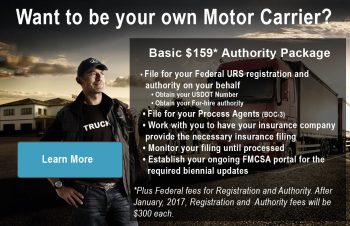
Practices That Maintain the Carrier/Contractor Relationship in Oregon
posted in Alerts, Blog, Uncategorized by Brian Gray
Practices That Maintain the Carrier/Contractor Relationship in Oregon
On July 20th, an Oregon appeals court ruled that owner-operators leased to Portland, OR company CEVA Freight are independent contractors according to Oregon state law and not company employees. This ruling frees the carrier from paying unemployment tax, and other certain taxes, on the owner-operators’ compensation.
How did this ruling come about?
According to CCJ, the Oregon Employment Department originally brought its complaint against CEVA Freight following an audit of the carrier’s 2009 and 2011 unemployment tax payments. The state’s labor department had asserted the truckers should have been classified as company employees and that CEVA must pay unemployment tax on their wages. An administrative law judge upheld the state labor department’s findings, which CEVA challenged. The July 20 ruling by the appellate court reverses the lower judge’s ruling, a victory for CEVA Freight
A three-judge panel for the Oregon Court of Appeals said in their decision that per Oregon law’s four-part test for determining whether a contractor is an employee, the owner-operators were not company employees.
What Oregon state law says about determining Independent Contractors
Both the Bureau of Labor and Industries (BOLI) and the Department of Consumer and Business Services’ Workers Compensation Division are required by court decisions to use different criteria to determine independent contractor status. These agencies require that the worker meet all the criteria of ORS 670.600 in order to be considered an independent contractor.
Under ORS 670.600, workers may be properly classified as independent contractors provided they:
- Are free from direction and control, beyond the right of the service recipient to specify the desired result, AND
- Are licensed under ORS 671 or 701 (State Landscape Architect Board or Landscape Contractors Board and State Board of Architect Examiners or Construction Contractors Board) if licensure is required for the service, AND
- Are responsible for other licenses or certificates necessary to provide the service AND
- Are customarily engaged in an “independently established business.”
What did CEVA Freight require of the owner-operators?
Many Owner-Operators operate under CEVA Freight’s authority, as is common industry practice. The owner-operators in question in the employment case, according to court documents:
- Either owned or leased their trucks
- Paid for their own business licenses
- Paid for their own insurance
- Paid for their own fuel, tires, maintenance, tools and uniforms
CEVA Freight’s requirements included the owner-operator to:
- Have trucks be white and split the costs with CEVA Freight to have the carrier’s logo decaled on the side
- Wear CEVA Freight uniforms and carrier CEVA Freight identification
- Attend some CEVA Freight required driver meetings
- and follow other standard requirements, like delivering loads within a certain window of time
However, those stipulations weren’t compelling enough to convince the court that the truckers were company employees. “Apart from those requirements, CEVA played little role in how owner-operators performed their work. Owner-operators provided and operated their own trucks and could hire their own drivers, establish their own work schedules, routes and delivery schedules, and load their vehicles according to their preferences. The direction-and-control test does not require that an independent contractor be free of all direction and control,” the judges write in their ruling.
This ruling is significant as it reaffirms traditional industry standards of how owner-operators and leased-on carrier are treated and compensated as contractors.







